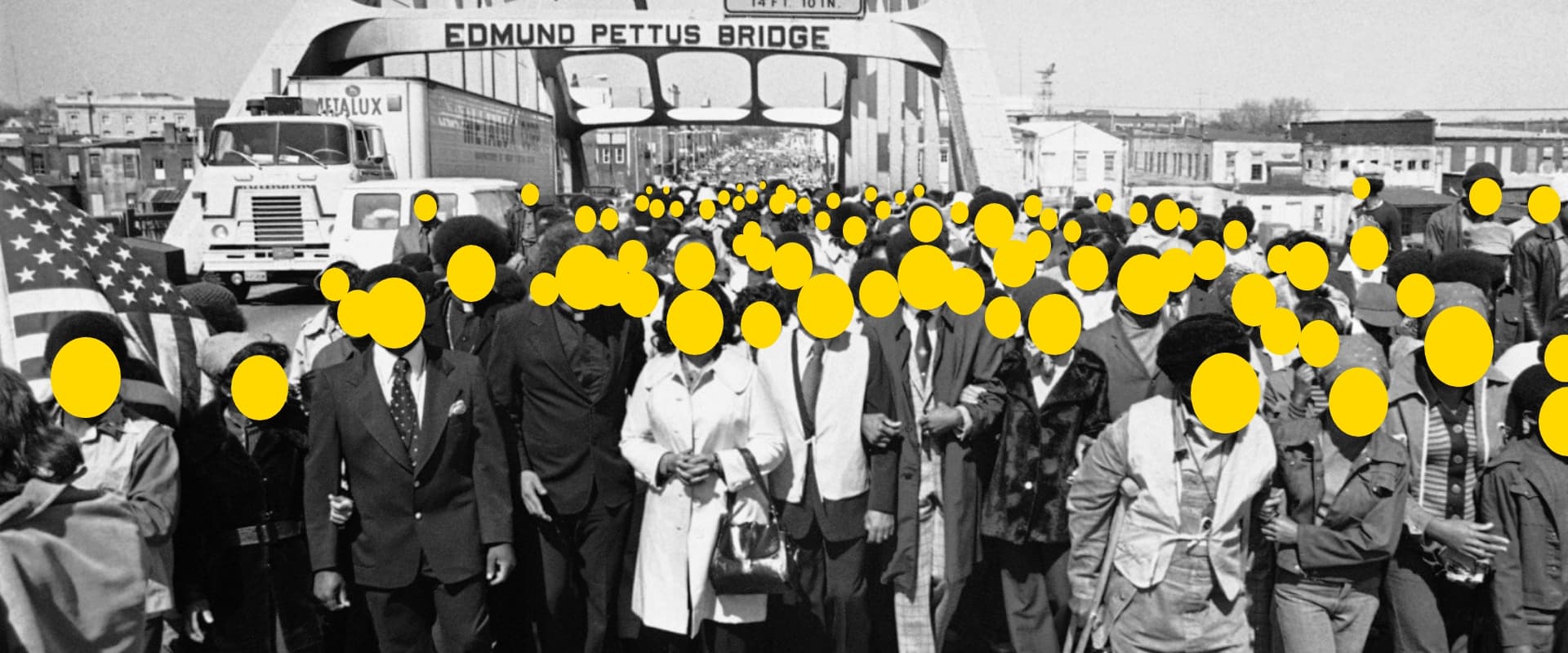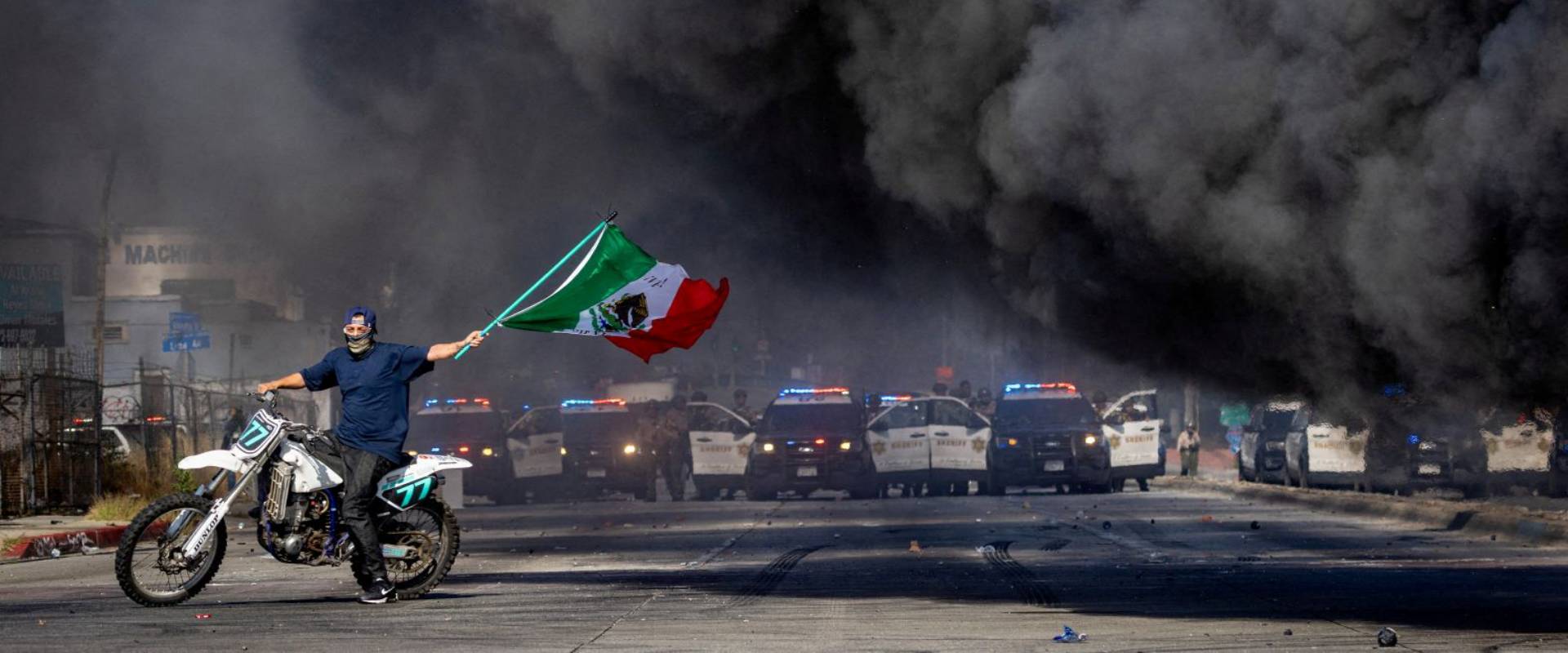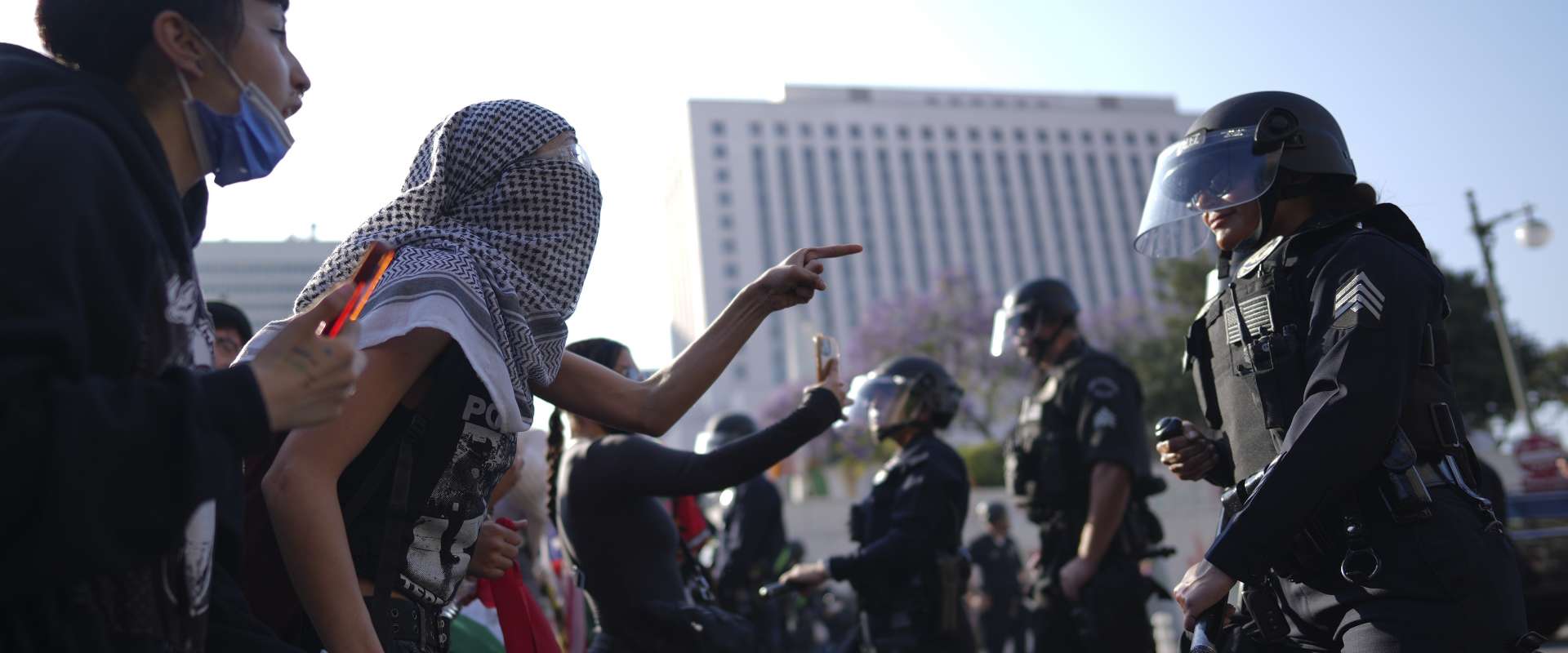Repression has always been a problem for people seeking social change. From direct physical attacks by police and vigilantes to the firing and evicting of union activists, the ruling class doesn’t make it easy to challenge their power. Contemporary methods of surveillance intensify that problem, making it easier for hostile actors to dox or persecute activists and threaten their lives and livelihoods.
How do revolutionary socialists deal with these threats? We need to protect ourselves, yet we also need to build vibrant movements that can involve more and more people. Strong, open movements are the best way to protect ourselves.
With social media and activism increasingly interwoven, the call to redact or remove protest photos has ballooned. Many well-intentioned attempts to protect individuals end up undermining struggle and hindering the potential for a powerful, class-conscious mass movement.
Individual safety versus collective action?
In short, we cannot let individual safety concerns solely dictate the path toward our liberation. The way forward requires us to strike a delicate balance between individual well-being and collective action for a common cause.
It is essential to recognize that workers and the oppressed are facing real dangers out there. By standing together we can better protect and support each other, amplifying our message and strengthening the bonds that unite us.
We must control our narrative
Photos and videos of protests are not isolated moments captured by a few individuals; they are part of a larger movement. Such media emerges from diverse sources and will continue to circulate, whether or not some activists avoid taking or suppress the sharing of photos and videos.
We should utilize these freedoms we have while they still exist to organize and prepare for uncertain times ahead. Demanding the removal of photos, blurring faces, or disguising identities will not shield us from a dystopian future; it will only hamper our collective struggle.
When it comes to political protest, the risk of nefarious spin from the capitalist media is real. Hence it is crucial to remember that it is the responsibility of activists to reclaim the narrative ourselves. As Eugene Debs pointed out, “The press and the pulpit have in every age and every nation been on the side of the exploiting class and the ruling class.” In removing or suppressing protest photos, we risk losing control over our narrative, allowing the story to be manipulated by those with dubious intentions, driven by bourgeois ideology.
Only activists can ensure that protest photos serve the purpose they were intended for — to challenge the status quo and to advocate for the exploited and oppressed. Our focus should not be fear-driven self-censorship, but shifting the narrative and reclaiming our message.
No expectation of privacy in public spaces
In today’s society, privacy has dwindled due to omnipresent surveillance by the state and private businesses. We cannot reasonably expect to have privacy in public spaces, and should take precautions accordingly. Moreover, while we generally have the freedom to assemble and speak our minds, we must not be complacent. Instead, we should utilize these freedoms we have while they still exist to organize and prepare for uncertain times ahead. Demanding the removal of photos, blurring faces, or disguising identities will not shield us from a dystopian future; it will only hamper our collective struggle.
The power of mass movements
The greatest defense of our rights — and the best way to expand them — is through a mass, united, and class-conscious movement of workers and the specially oppressed standing up against all forms of exploitation and oppression. As Rosa Luxemburg stated, “The masses are the decisive element, they are the rock on which the final victory of the revolution will be built.”
Self-censorship undermines otherwise successful propaganda campaigns that have been tirelessly built. Activists cannot afford to throw our hard work away! Again, total human liberation can only be achieved by building a mass movement that normalizes our struggle and highlights its importance. Photographs of protests do just that.
Amplifying our message
Let’s be clear: protests serve as powerful tools intended to reach a wide audience and amplify our message. They boost participants’ confidence and raise awareness. They foster solidarity between workers and the specially oppressed. It’s vital to craft compelling propaganda (effective dissident communication) that extends beyond our immediate circles, showcasing the significance of mass, independent action. Self-censorship is antithetical to a protest movement and its ability to gain popularity, and thus power.
Strength in unity
Safety and protection comes from the strength of unity within mass liberatory movements, not from relying on legislation or elected officials. To drive real and lasting change, we must harness the power of collective action and the solidarity achieved within. However, we cannot build such movements if we operate clandestinely, hiding in the shadows, and obscuring our faces, as if we are engaged in risky or illegal activity.
Self-censorship sends mixed messages, undermining our efforts to inspire solidarity. We must demonstrate that progressive social movements are not engaging in dangerous activities or taking up fringe concerns, but the opposite: they are the only thing standing in the way of a more dangerous world and address concerns that affect all working-class and oppressed people.
The same is true for protest actions themselves — organizing only among trusted “whisper networks” only yields fewer supporters and greater risk. Not only is this more dangerous, it perpetuates the idea that our activism is dangerous, divisive, and of questionable value. It reinforces harmful stereotypes and sends the wrong message to the masses.
Transparency: inspiring solidarity
Self-censorship sends mixed messages, undermining our efforts to inspire solidarity. We must demonstrate that progressive social movements are not engaging in dangerous activities or taking up fringe concerns, but the opposite: they are the only thing standing in the way of a more dangerous world and address concerns that affect all working-class and oppressed people. By concealing our activism, we risk losing the opportunity to engage and enlighten others.
Transparency in our actions is essential to build support and understanding for our struggle. To achieve true liberation, we must not shy away from the spotlight, but face it wholeheartedly. It has been this way in all social movements since humans discovered how to record life in image form. Can any of us imagine learning about the Civil Rights movement or the struggle against the Vietnam War without such imagery?
The communist perspective: unity and liberation
Communists seek unity among all exploited and oppressed people, ultimately leading to liberation through revolution. Our social media practices are not matters of preference or style; they are based on theoretical roots. The censorship of protest photos undermines our politics, principles, and goals.
When considering the potential impact of censorship on struggle, we must carefully weigh the consequences. It is essential to respect the wishes of those who want their faces to be visible, using their likeness as a powerful tool in our fight. Those who do not wish to be seen may make that choice in a way that works for them; however every decision we make should serve the larger goal of achieving human liberation.
Our organization’s stance
The Denver Communists use our website and social media to promote the social movements and labor struggles we support. While we exercise discretion to avoid taking or sharing photos that might get progressive activists in trouble, as a matter of policy we do not unpublish protest photos or obscure faces in them. We call on other organizations and activists to adopt this stance as well. Those who demand the wholesale suppression of protest photos do great damage to progressive movements.
That said, strategies and tactics should be commensurate with the current level of struggle and its imposed dangers. We may reach a time when concealing identities becomes necessary. Our organization continues to evaluate our conditions and encourages others to do the same. We value responsible activism and prioritize the safety of all participants, while advocating for a just and liberated world. Again, we are committed to preserving the unfiltered truth of our activism and ensuring that our message reaches the public without censorship or distortion.
If you think photos of you at a protest might put you in danger, we encourage you to take necessary precautions for your well-being, which might include concealing your identity. However, until absolutely necessary, we will march forward without concealing ours. Amplifying politics through the beautiful faces of brave individuals standing up for their rights is essential. In essence, protests are desperate attempts to be seen and heard. We must not let fear overshadow our determination to achieve progressive change. Protest actions and the media they produce are two of the most powerful weapons we wield.
Facing the “unblurred” truth
In conclusion, the call for face-obscuring or removal of protest photos is well-intentioned but wholly misguided. The importance of protest photos cannot be underestimated. Self-censorship by a social movement or organization only hampers its potential and undermines the power of its message.
Let us bravely face the “unblurred” truth together and show the world that we are fighting for human liberation. In this way, we can reclaim control over our narrative and challenge regressive ideas. Solidarity and collective action are our ultimate weapons in this fight. Let us be bold in our pursuit of liberation by showing the world our beautiful faces, united in opposition against oppression and exploitation.



